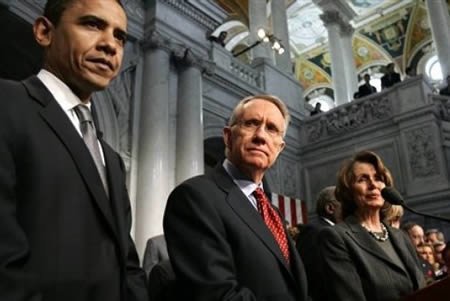
The U.S. Senate is considering ending, or at least reducing the strength of, the filibuster. The filibuster allows the minority in the Senate to prevent the majority from passing a bad bill, through delay or other tactics. Who wants to get rid of the filibuster? Liberal socialist Democrats, of course. They cite the collapse of the latest trillion dollar federal ‘stimulus’ bill as evidence for why the filibuster should go. “We can’t get anything done!” they scream.
Government getting nothing done: Is that necessarily a bad thing? Is it ever a bad thing, anymore? Whatever happened to Thomas Jefferson’s edict, “The government that governs least governs best.” This idea has never applied better than to the current Congress, who spent trillions of dollars in future Americans’ productive effort, assuming there will be any after this spending spree. The last thing we want socialist liberals in the majority Democratic Party (and a few in the Republican party, as well) is to DO anything. Essentially everything they do is bad or wrong for the country — even those on whom they spend, who will be harmed by the bankruptcy of the government, and possible collapse of the economy, along with everybody else.
The irony here is that if liberal Democrats get their way, and reduce the impact of the filibuster, it may harm themselves. They’re counting on the Tea Party conservatives in the new Republican House not to send them legislation they dislike. If all of past history is any guide, they won’t. Republicans in the House will cave and compromise with liberals in both parties to produce the same old same old. At “best,” they’ll return us to the billion dollar deficits of the Bush era rather than the trillion dollar deficits of the Obama era. Shrewd liberal Senators (including Republicans such as Scott Brown, from Massachusetts) worry that Tea Party activists will inhibit future spending in the Senate, as they did in the outgoing one. They don’t want their spending restrained, because spending other people’s money is how they hold on to power.
One true test of the new Congress will be the issue of health care. If the Republican House of Representatives does not (1) vote to repeal ObamaCare and (2) vote to allow purchase of health insurance across state lines (a free market initiative), then they deserve to be history in two years. These are the two bare minimum things an advocate of freedom and individual rights should expect of the new Congress, aside from massive and unprecedented spending cuts. Will the Senate vote it down? Likely so. Will Obama sign it, if it passes? Never in a million years. But Republicans must pass this kind of legislation in the House, to prove that they mean it, and to show what we can expect if there actually is a Republican President and Senate in 2013. Otherwise, why bother to vote for the people who gave us the Bush and Obama eras?
Much is made of the success of Ronald Reagan’s presidency. However, it’s Reagan’s errors from which Republicans, going forward, should learn. Back when Ronald Reagan was President, he didn’t even attempt to reduce government spending. He merely reduced the rate of government increases in non-military spending. He reduced the growth of the welfare state, not the welfare state itself. He probably saw this as a realistic first step towards eventually reducing or even eliminating the welfare state. Unfortunately, he was mistaken. For one thing, you can’t get rid of the welfare state if you don’t get rid of the entitlement mentality which underlies it. In America since Reagan’s time, that mentality has only grown, not gone away. Second, you can’t compromise with the devil. The “devil” in this context are the liberal socialists who control the Democratic Party and partially inhabit the Republican Party. When Reagan reduced the growth of government spending on the redistributive welfare state, they spent more. As the economy improved from massive tax cuts, they spent what would have been a surplus.
Today, the situation is much worse. There’s no surplus. There’s not even a potential surplus. There’s only a growing deficit and national debt with grave consequences for the American currency — indeed, the whole world economy as we know it. The Reagan approach of reducing increases in spending, even if could work, would have no impact. It’s not at all clear how willing even the Tea Party wing of the Republican Party will be to cut government — not just the rate of government growth, but government itself (e.g. education).
It’s likewise not clear that anybody understands the primary issue isn’t fiscal, it’s economic and moral. In other words, government must be cut not merely to balance the budget, but to reduce the role of government in the economy so the economy may once again grow. Government should leave people alone because it’s the right thing to do, not only because it will balance the budget. Much depends on the new Congress not making Reagan’s errors, but unfortunately there’s no Reagan in sight to even make his errors. The Tea Party may be an effective voice of opposition at important times, but an opposition cannot lead.
End the filibuster? That’s the least of Congress’ problems. The filibuster may inhibit government “progress” in its goals, but the government is no longer on the side of the people and no longer supports the objective requirements of a capitalist, free market economy. What’s needed is not an end to the filibuster, but a resurgence of freedom, capitalism and individual rights.
